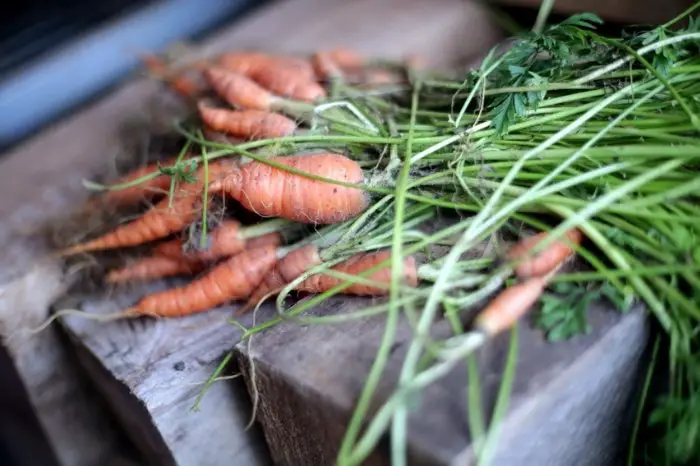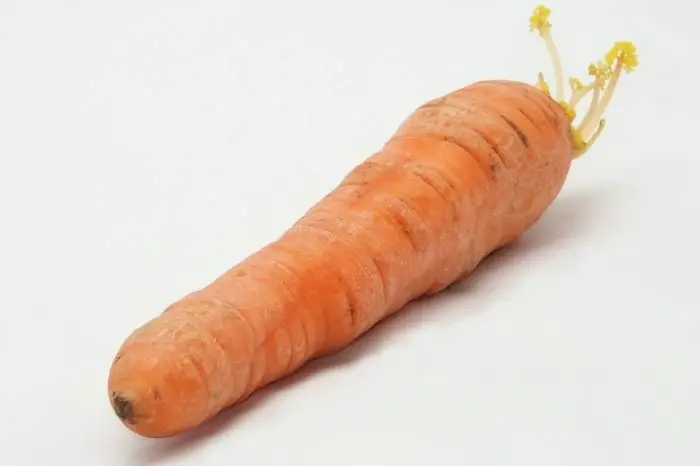Last Updated on December 31, 2022
Do you know how to tell if baby carrots are bad or still in good condition to be consumed? If not, join many others and learn how to.
Do you love munching on fresh carrots throughout the day? Most people do! Fresh carrots are a delicacy you will find in most homes. Storing them in the refrigerator makes it more convenient instead of heading to the grocery after every few days.
However, the tricky part comes in storing these vegetables. Sometimes it is hard to know when they’re going bad until they’re entirely rotten. The worst thing about it is that vegetables do not come with an expiration date label.
That said, how can you tell if carrots are bad or still safe for consumption? This article will look at various ways to know if carrots are good and everything about storing them.
Do Baby Carrots Go Bad?
The first and most important thing we all need to understand is carrots can go bad. Both regular carrots and baby carrots are the same. They have the same perishability making them susceptible to rot after a few days.
It is therefore essential to pay attention to the time you have a store purchase your carrots to put into consideration how long they will last.

With that in mind, here few things you should consider about your carrot’s shelf life:
-
-
If you store your carrots in a warm area, they will only last up to 4 days
-
Storing your carrots in the refrigerator can last you up to four weeks
-
When stored in the freezer, they will be able to maintain their optimum freshness for 12 months. They can still be safe for consumption even beyond this period if they have not shown any signs of rotting.
-
If you chop your carrots and place them in the refrigerator, you can use them for about 2 to 3 weeks.
-
Cooked carrots stored in the refrigerator can last for three to five days.
-
Cooked carrots stored in the freezer can last up to 12 months.
-
How To Tell If Baby Carrots Are Bad
As emphasis, baby carrots go bad in the same way usual carrots do. The only difference is that baby carrots are too short to bend when testing them for wilting. The surest signs of carrots going bad are visible mold, slimy texture, or bad smells.
The easiest way to tell when carrots go bad is to use the following steps.
Look For White Blush
White blush forms on the surface of the carrots as white lines. It is a thin layer of dehydrated carrots that develops when exposed to the atmosphere causing the outer portion of the skin to dry. If you notice these white lines on your carrots, they are still safe for consumption. However, keep in mind that this is a sign your carrots are about to die out anytime soon. If these lines are too many, you should throw away your carrots.

Check For Spots
Fresh carrots have flawless skin without spots. When you notice white or darker areas on the carrot skin, this means rotting has started taking place. These carrots are not safe for consumption and should be discarded.
Check For Consistency
If your carrots have stayed out for a week or so out of the refrigerator, touch them to check if any parts have a mushy consistency or slimy part on their surface. If you notice any of these signs, throw this out immediately. These are slimy or rotten carrots that could lead to unwanted health issues. You can also check the thickness or size of the full carrot stop if it is a bit thinner than its original size; they are also bad and need to be thrown out.
Read more about Can You Eat A Tomato With Seeds Sprouting Inside
Smell Your Carrots
Fresh carrots do not emit any foul smell. If your carrots are already rotten, they will release an unwanted odor. The smell is a result of growing bacteria in the carrots. If you notice any weird smells, throw them out right away.
How Can You Extend Your Carrots Shelf Life?
If you love munching on raw carrots or using them for cooking your favorite dishes, there’s nothing wrong with stocking up a good amount. One more tip you need to learn is how to store your carrots properly.
You also need to know how to prolong the shelf life, especially for sliced and cooked carrots. The best way is to freeze your carrots or refrigerate them.
Prepworks by Progressive Produce ProKeeper, 3-Quart, Stay-Fresh Vent System
Here are some quick tips to help you do that.
- Quick Freeze Cooked Carrots. If you have thoroughly cooked your carrots, quick-freeze them so you maintain their freshness, texture, and taste. You can do this by arranging your carrot slices on a baking sheet and placing them in the freezer. Once fully frozen, place these frozen carrots in a sealed container or ziplock bag.
- Blanch Your Sliced Carrots Before Storing Them. If you want to keep your carrots sliced, it is best to blanch them first. Once they have cooled down, drain them and place them in zip-locked bags removing as much air from them as possible. To ensure no air remains in the Ziploc bags, you can use a vacuum sealing system.
What Happens if You Eat Bad Baby Carrots?
You could get food poisoning if you eat bad baby carrots. Symptoms can range from mild to severe and may include nausea, vomiting, diarrhea, stomach pain, and fever.
If you suspect you ate rotten baby carrots, it’s important to pay attention to your symptoms and seek medical attention if necessary. You might have trouble keeping fluids down if your symptoms are severe. In this case, getting medical attention as soon as possible is essential. Food poisoning can lead to dehydration and other serious complications.
You should always handle and store baby carrots properly. This will help prevent them from going bad. Store your baby carrots in the refrigerator to avoid spoilage, and wash them thoroughly before eating them raw or using them for cooking.
If you notice that your baby carrots are discolored or have an off odor, avoid eating them. These are signs of spoilage.
Can You Get Sick From Slimy Carrots?
Slimy carrots are a sign of spoilage. If you notice your carrots are slimy, they are unsafe to eat. Consuming spoiled carrots could lead to food poisoning.
Some home cooks believe carrots with a thin slime layer are still edible. This might be true if the carrots have no foul odor and a firm texture. However, if your carrots have a thick slime layer accompanied by a foul smell and soft texture, it is better discarded.
Slime on carrots is caused by bacteria. These bacteria thrive when carrots receive improper ventilation or have started to rot. Carrots naturally have bacteria from the ground on their skin. The bacteria have no oxygen when this veggie is vacuum sealed or stored in airtight containers. They need oxygen to survive, and without it, they need to resort to other forms of aspiration. One such is an anaerobic aspiration. During this process, the bacteria produce an acid that presents as a slimy layer.
You should store your carrots in cool open spaces. I also suggest eating damaged carrots first to prevent rotting. Bacteria create slime on rotten skin, and the slime can spread if one carrot is infected.
Conclusion
Carrots are some of the healthiest vegetables you can get your hands on. But consuming spoilt carrots could do you more harm than good.
To protect yourself from eating rotten carrots, it is best to store your carrots properly and try to prolong their shelf life as best as you can. Floppy carrots can be consumed, but one thing you need to know is the floppiness that happens due to dehydration. After all, carrots are 80-95% water.
To regain their stiffness, you can place the flaccid carrots in cold water for up to 3 to 5 hours before use. Afterward, you will find that they are nice and firm again.
However, don’t forget that their vitamins are water-soluble; therefore, the carrots may not be as nutritious. This is because they will have lost most of their nutrients due to dehydration.
FAQs
Do baby carrots really go bad?
Yes, they do go bad. It's a very common misconception. They do, and if you don't eat them, or cook them, then they will eventually go bad. They are perishable, and it's only a matter of time before they start to lose their freshness and flavour.
Like many foods that have a shelf life, baby carrots (sometimes called microgreens) can lose their color and flavor if not refrigerated.
Are baby carrots supposed to be slimy?
No, they're not. They are meant to be crunchy and firm, just like any other vegetable.
I used to think that the reason they are slimy is because they are grown in a wetter environment than most vegetables (for example, soil instead of sand).
How fast do baby carrots go bad?
I think this depends on the type of carrots you are buying. If you are buying organic, then they are most likely to last longer. In terms of freezing, I don't recommend it because they get mushy and won't cook up as well. It's not worth it to me, so I just eat them as soon as possible. The only thing I would suggest is to make sure they are cooked, then refrigerate in an airtight container. That way you can just pop one in your mouth without worrying about it getting cold.
When they are well refrigerated they should last around a month.
What should a healthy carrot look like?
The scientists have identified the most important factors for making an ideal carrot. They found that a carrot’s “ideal” look is determined by its size and the ratio of its green to white parts. This means that if you are growing your own carrots, you can make them more attractive by adjusting the amount of green on the vegetable.
How can I make baby carrots last longer?
Wash the baby carrots and cut them in half, then put them in a ziplock bag and add them to a bowl of ice cold water.
Let the carrots soak in the ice cold water for 24 hours. This will keep them fresh and crisp for up to a week. If you want to use the carrot for baby food, rinse it off and cut it into pieces that are about 1/2 inch thick.
Should you store baby carrots in water?
The debate over whether to store baby carrots in water or not has raged for years. While some claim that baby carrots need to be stored in water, others believe they don't need to be stored at all. The reason for the controversy is that the way in which you store them may affect their taste and appearance, as well as their nutritional value.
Yes! They'll be softer and fresher if stored this way, but be sure to change the water after a few days.

Lory is an avid gardener who loves spending time outdoors. She is passionate about using her green thumb to create beautiful, lush gardens for her friends and family. She finds joy in tending to her garden, trimming plants, and cultivating new species. She loves to share her knowledge and experience with others who have a similar enthusiasm for gardening. Lory is a true nature enthusiast who loves to share her enthusiasm for the outdoors with all who meet her.

